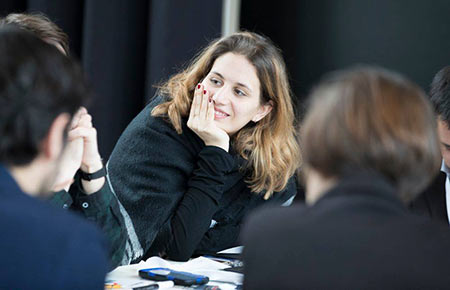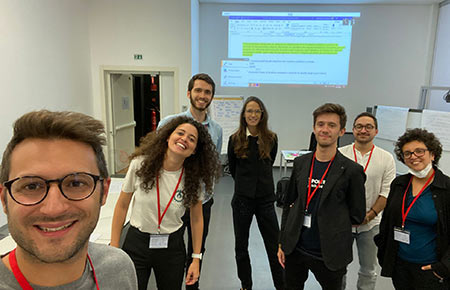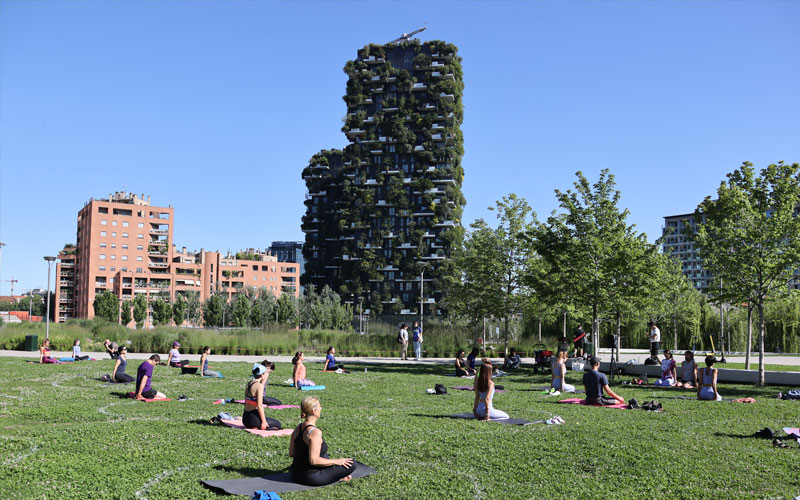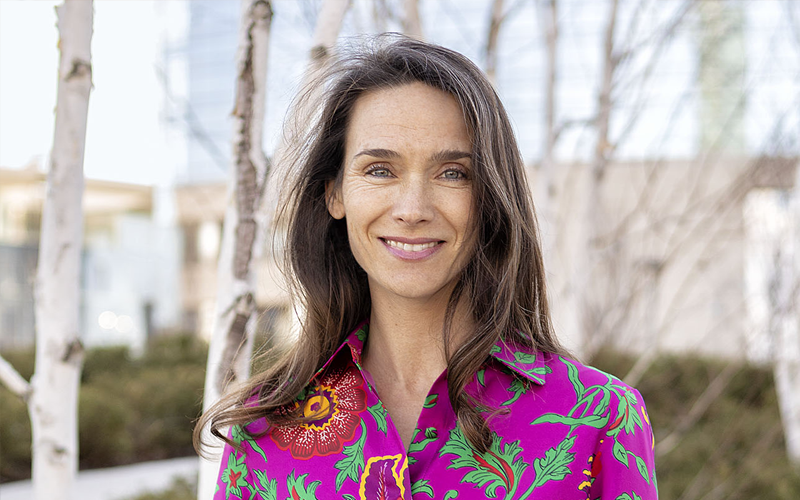COP26, the United Nations conference on climate change, directly involved the world of real estate. Italy and Milan approached this event with a series of meetings and public debates on sustainability. Among these was Italy Goes Green, launched by Officine Italia, Vodafone Italia, and Politecnico di Milano and supported by BAM - Biblioteca degli Alberi Milano, as part of the Ministry for Ecological Transition’s All4Climate Italy 2021 initiative. The event aimed at formulating ten transformative questions to stimulate the discussions of politicians and decision-makers gathered in Glasgow for COP26 and directing them towards tangible and feasible solutions.
Project Lead of Italy Goes Green for Officine Italia, Diletta Di Marco underlines the urgency of this debate: “Italy Goes Green was created by young people and designed for young people, and takes its cue from the forecasts on the planet’s future. These are bleak predictions, yet not enough effort has yet been made to change direction. Our generation could bring about change and the responsibility to combine new ideas and existing models and make them more forward-looking. But we are aware that we cannot do everything alone, which is why the Italy Goes Green model has placed partnership at its heart, with new ideas, approaches and energies coming to hybridise with skills and experience gained over the years.”

Diletta Di Marco, Italy Goes Green Project Lead
COIMA and Riccardo Catella Foundation’s support for this commitment arrived almost naturally, since sustainability is a value and goal underlying their operations: COIMA Head of Sustainability and Communications and Riccardo Catella Foundation Managing Director, Kelly Russell Catella, who was a round table on smart cities and urban living event facilitator said: “CO2 emissions from the real estate sector are 40 per cent of total emissions, and acting on building stock is necessary".
Diletta Di Marco said: “At Officine Italia we are facing a series of ‘big challenges’ to which we can and must give our contribution. Climate change is one of these challenges and one of the most complex to face. We are addressing a problem so vast, multifaceted and dynamic that one approach, one response is not enough. While estimating this complexity we realised how little we question our approach to the problem, sometimes oversimplifying, or making it theoretical and distant. The ‘Smart cities and life in urban areas‘ debate is close to COIMA’s activities and left us with much hope about the widespread awareness of social issues and their link with urban design and community creation.”
Kelly Russell Catella said: “COIMA fully shares this approach, BAM - Biblioteca degli Alberi Milano park, managed through a public-private partnership between COIMA, Riccardo Catella Foundation and the Municipality of Milan, is the most explicit demonstration of this commitment to the creation of a strategic space model designed to improve the liveability of people in the city. According to studies, green areas are not only useful for improving air quality and reducing pollution in urban areas but increase the physical and cognitive well-being of their inhabitants.”
During the project Italy Goes Green, young participants, helped by green leaders who assisted the discussion, asked ten ‘transformative questions’ proposed to the participating institutions and companies. “We do not believe that these questions can have a single answer, given the theme complexity, but we are pleased with their inspirational power, which must be grounded through tangible actions. Therefore, we debate with the various event partners to “disseminate” these questions in their communities and trigger discussion. To have any impact at a corporate, local or other level, a community must choose to get involved and change its thinking. The challenge now will be to support this paradigm shift with practical responses, grounding innovative projects and quantitative measurement of results.”

Kelly Russell Catella and the young participants working together on
the transformative question about Smart Cities and Urban Life
Real Estate is among the leading sectors to which these questions are addressed. Therefore, it is not surprising that real estate acquired a central role during COP26, especially from the urban regeneration perspective. In our country, this is a subject that directly involves institutions and public administration. Kelly Russell Catella pointed out, “in our country, the public sector has the most extensive portfolio of obsolete buildings on the market, and public administration buildings could be the driving force behind a significant urban regeneration and echological transformation operation. This partnership can be achieved through technological innovation and circularity of material.”
Read also: Connected and inclusive: the features of future cities
Another crucial issue is measuring the impact of real estate activities on the environment: “a fundamental aspect for our industry and on which COIMA is working to calculate and consider the CO2 emissions and the consumption of natural resources in our supply chain. Only then can we measure our actual impact and go beyond just measuring direct emissions. In addition to continuing its process of creating more environmentally advanced buildings, COIMA, has started to define a decarbonisation plan for its portfolio.”
While waiting for the Glasgow meetings to bear fruit, COIMA is ready to support new innovative proposals such as those brought by Italy Goes Green and creating a “system” project for the renewal of Italian cities.



